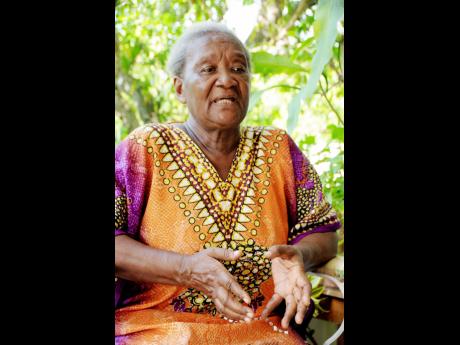'Policy was hostile, racist' - 82-y-o Windrush victim says British gov't attempting to deny Caribbean people rightful place in history, society
An 82-year-old Jamaican Windrush victim says that the British government's "hostile environment" immigration policy was a covert racist attempt to deny people of Caribbean heritage their rightful place in British history and society.
It is a view held by Icilin Brown, who migrated to England in 1957, as many other Jamaicans had done in search of a better life, only to realise it was not what it seemed.
"Many of us got on with life; we got to work in helping to rebuild London after the war. Some worked as nurses and engineers, and in other professions. In the early years, you feel that you belong to this place they called the mother country. And then sooner rather than later, you found out that you are actually an outsider; you are not welcomed," Brown shared with The Gleaner.
Sitting on the veranda of her Clarendon Gardens home in May Pen, Brown explained the euphoria that took hold of the Jamaican population, having learnt that they could migrate to England for work.
"In those years it was a big thing with the folks who went over in 1954, 1955 and about 1956. Imagine what we felt when we saw the big notices on windows prominently displayed -'No Irish, No Blacks, No Dogs'. I think even today, while the notices are no longer in the windows, the racism is still the same," she stated.
STRUGGLE TO REGAIN STATUS
Brown's four children were all born in England during her and her late husband's first stint in the United Kingdom (UK) in 1955. She subsequently returned to Jamaica for several decades.
During that time, she struggled to regain her status as a British citizen even though she was allowed to travel on a visa to and from the country.
"Effectively, I was stripped of my status at the whim of a policy that was misguided and cruel at the least, when I was informed that I no longer enjoy the privilege of British citizenship since Jamaica became Independent in 1962," she stated.
Brown explained that each time she went to England, she was required to apply for a visa.
"In 2016, I was supposed to join my family, including my four children and grandchildren, and I couldn't. I was here alone. We couldn't be together. And so I had the most gut-wrenching, disappointing experience when I got information that they denied me the visa twice," she said of her most recent attempt.
THERE ARE OTHER WAYS
"If it wasn't for the input of my children, and their determination, which prompted the positive action from their members of parliament in the UK, I guess nothing would have changed," Brown shared.
"My situation is mild compared to others, but I want to urge those who are fighting it legally, there are other ways. Stick together. Family really does matters. Make use of the media and keep at it."
The Windrush Generation refers to the immigrants who were invited to the UK between 1948 and 1971 from Caribbean countries, such as Jamaica, Trinidad and Tobago and Barbados, to help rebuild the country after the war. The name derives from the ship MV Empire Windrush, which, on June 22, 1948, docked in Tilbury, Essex, bringing nearly 500 Jamaicans to the UK.
In recent years, thousands of people who subsequently arrived from the Caribbean to the UK as children were threatened with deportation in what became known as the Windrush Scandal. They were told that they were in Britain illegally, despite having lived and worked in the country for decades.

